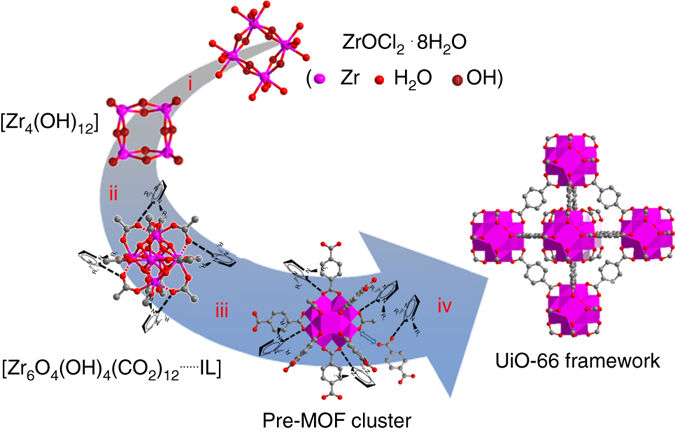Scientists Discover Ionic Liquid Accelerates the Crystallization of Zr-based Metal-Organic Frameworks
Zirconium (Zr)-based metal-organic frameworks (MOFs) have wide applications due to their excellent thermal, aqueous, acid stability and easy modification with a desired functionality compared to other common MOFs. In general, the Zr-based MOFs are prepared by solvothermal procedure. To overcome the slow kinetics of nucleation and crystallization of Zr-based MOFs is of great interest and challenging.
Ionic liquid as a medium for material synthesis has many appealing properties such as high thermal and chemical stability, extremely low volatility, the abilities to simultaneously dissolve both organic and inorganic precursors and serve as structure-directing agent because the liquid is highly structured with relatively long-range correlations.
Recently, a research group at Institute of Chemistry of Chinese Academy of Sciences led by Prof. JL Zhang reported that an ionic liquid as solvent can significantly accelerate the formation of Zr-based MOFs at room temperature. This work was published on Nat. Commun.
In comparison with the conventional methods for promoting MOF crystallization, e.g., high-energy input or adding additives, the present strategy is rapid, low energy and involves no additional additives. Moreover, the MOF particle size can be easily modulated by changing the anions and cations of ionic liquids.
The rapid and room-temperature synthetic route produces Zr-based MOF nanoparticles with small particle size, missing-linker defects, and large surface area, which have shown potential for catalyzing Meerwein–Ponndorf–Verley (MPV) reaction.

Diagram illustrating the UiO-66 formation in IL. i ZrOCl2-8H2O hydrolysis to polymeric hydroxide Zr4(OH)12. ii Complexation of zirconium by addition of HAc. iii IL-assisted linker exchange between HAc and H2BDC to produce pre-MOF cluster. iv UiO-66 framework formation (Image by Prof. ZHANG Jianling)
Contact:
Prof. ZHANG Jianling
Institute of Chemistry, Chinese Academy of Sciences
Email: zhangjl@iccas.ac.cn





